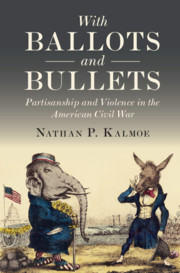Book contents
- With Ballots and Bullets
- With Ballots and Bullets
- Copyright page
- Dedication
- Epigraph
- Contents
- Figures
- Tables
- Acknowledgments
- Preface
- 1 An Introduction to Partisan Warfare
- 2 The Roots of Partisan Civil War
- Part I Mobilizing Partisan Warfare
- Part II Ballots in a Partisan Civil War
- Part III Legacies of Partisan Violence
- Conclusion
- Notes
- References
- Index
Conclusion
Lessons from Partisan Warfare
Published online by Cambridge University Press: 20 October 2020
- With Ballots and Bullets
- With Ballots and Bullets
- Copyright page
- Dedication
- Epigraph
- Contents
- Figures
- Tables
- Acknowledgments
- Preface
- 1 An Introduction to Partisan Warfare
- 2 The Roots of Partisan Civil War
- Part I Mobilizing Partisan Warfare
- Part II Ballots in a Partisan Civil War
- Part III Legacies of Partisan Violence
- Conclusion
- Notes
- References
- Index
Summary
I conclude the book by reviewing the main findings and their broader implications for mass partisanship and violence beyond the Civil War era. The essential ingredients for partisan conflict have been present throughout most of American history: strong political identities placed in competition. Yet, the U.S. has been mostly free from partisan violence over the past half-century despite partisan animosity, electoral discontent, and even some public support for violence. What changed in the Civil War era was how partisanship aligned with other important social identities, how party leaders fueled the crisis, and then how parties explicitly organized legitimated violence via party control of government. The country is in an uncomfortably similar position today – racial-religious-partisan alignments, political demonization, rhetoric rejecting fair elections, and even language encouraging violence from prominent leaders, including the president. I draw out those implications here.
Keywords
- Type
- Chapter
- Information
- With Ballots and BulletsPartisanship and Violence in the American Civil War, pp. 208 - 228Publisher: Cambridge University PressPrint publication year: 2020

